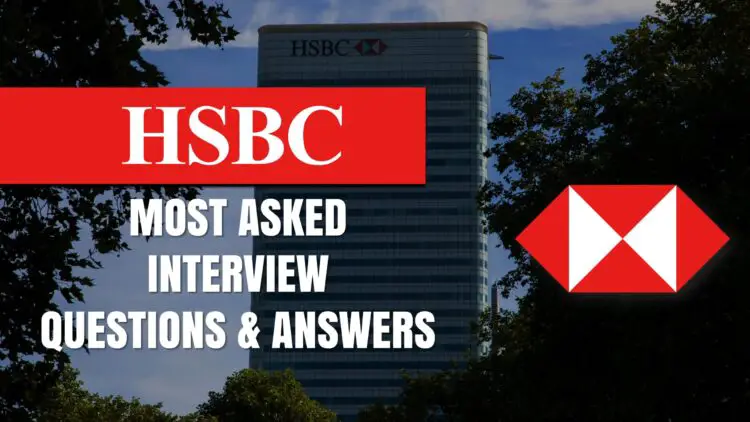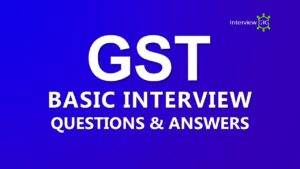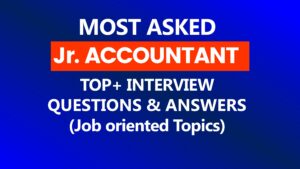Starting your career in banking with a prestigious institution like HSBC is a significant opportunity that requires thorough preparation. Whether you are a fresher aiming to land your first banking job or looking to understand HSBC’s interview process, it’s essential to be ready for questions that assess both your technical knowledge and your alignment with the company’s values. HSBC interviews often include questions about your background, motivation, strengths, and situational responses that reflect real workplace scenarios.
This blog provides a comprehensive guide to common HSBC interview questions and answers tailored for freshers, along with practical tips to help you present yourself confidently and ace your first banking job interview.
Question: Can you tell me about yourself?
Interviewer Expectation: They want to see how you align with the role, your communication style, and a balance of professional background and personality.
Sample Answer: I have a background in finance and business management, with over five years of experience in the banking sector. I started my career as a financial analyst, where I developed a strong foundation in data analysis and risk assessment. Over the years, I transitioned into client relationship management, which allowed me to hone my communication and interpersonal skills. I am passionate about helping clients achieve their financial goals and believe that building trust is key to successful relationships. Outside of work, I enjoy volunteering in financial literacy programs, as I believe in empowering others with knowledge.
Question: What do you know about HSBC’s business model and core values?
Interviewer Expectation: The interviewer wants to gauge your understanding of HSBC’s business and whether your values align with the company’s.
Sample Answer: “HSBC is a global banking and financial services organization with a strong presence in key markets around the world. Their business model is diverse, encompassing retail banking, commercial banking, global banking and markets, and wealth and personal banking. I understand that HSBC places a strong emphasis on core values such as ‘being dependable, open, and connected’. I’ve also noted their commitment to sustainability and supporting the communities they operate in. I am aware of their focus on the Asia market.
Question: What leadership style do you follow?
Interviewer Expectation: The interviewer wants to understand your approach to leading teams and how you motivate and guide others.
Sample Answer: “I believe in a collaborative and empowering leadership style. I strive to create an environment where team members feel valued, heard, and motivated to contribute their best. I focus on clear communication, setting achievable goals, and providing constructive feedback. I also believe in leading by example and being adaptable to different situations and team dynamics. I try to adapt my style to the needs of the team and the task at hand.”
Question: Why do you want to work at HSBC?
Interviewer Expectation: Genuine interest in HSBC’s culture, career growth, and global impact.
Sample Answer: I am drawn to HSBC because of its strong global presence and commitment to sustainability. I admire the bank’s focus on innovation and its efforts to adapt to the changing financial landscape. I want to be part of an organization that not only values financial success but also prioritizes social responsibility. I believe that my skills and values align well with HSBC’s mission, and I am excited about the opportunity to contribute to a team that is making a positive impact on communities worldwide.”
Question: What do you consider the most important aspect of being a leader at HSBC?
Interviewer Expectation: The interviewer wants to understand your perspective on leadership within the context of HSBC’s values and business objectives.
Sample Answer: “I believe the most important aspect of being a leader at HSBC is fostering a culture of integrity and trust. This involves upholding the highest ethical standards, promoting transparency, and building strong relationships with team members, clients, and stakeholders. In a global organization like HSBC, it’s also crucial to be adaptable and culturally sensitive, and to ensure that the team is aligned with the company’s vision and values. Building a team that is both competent, and ethical is very important.”
Question: What is your experience with financial analysis or modeling?
Interviewer Expectations: Demonstration of relevant experience and skills in financial analysis or modeling, with specific examples of tools and outcomes.
Sample Answer: I have over four years of experience in financial analysis, primarily focusing on budgeting, forecasting, and variance analysis. In my previous role, I developed financial models to assess project viability and support strategic decision-making. I utilized Excel extensively for scenario analysis and created dashboards to present key metrics to stakeholders, which improved our reporting efficiency by 30%.
Question: How do you handle conflicts at the workplace?
Interviewer Expectation: Emotional intelligence, problem-solving ability, collaboration, and professional maturity.
Sample Answer:
I believe conflict, when handled correctly, can lead to stronger collaboration and better outcomes. I approach it by first understanding the other person’s perspective without judgment, then clearly expressing my own point of view. I aim to find common ground and focus on the shared objective rather than the disagreement. In one case, a colleague and I disagreed on data interpretation for a report. Instead of escalating, I suggested we both validate our sources with a third team member and align on the methodology. It turned into a constructive discussion, and we actually improved the final analysis by combining our insights.
Question: What are your long-term career goals?
Interviewer Expectation: They want to see ambition, alignment with the company’s growth, and your desire to stay and develop with them.
Sample Answer: “My long-term career goal is to advance into a leadership position within the financial services industry, where I can leverage my analytical skills to drive strategic initiatives. I aim to develop expertise in areas such as risk management and financial strategy, ultimately contributing to the growth and sustainability of the organization. I see HSBC as a place where I can achieve these goals while making a meaningful impact.”
Question: What do you understand about HSBC’s financial services?
Interviewer Expectations: Demonstration of knowledge about HSBC’s services and operations, with an understanding of how they align with the bank’s mission.
Sample Answer: “HSBC offers a wide range of financial services, including retail banking, wealth management, commercial banking, and global banking and markets. The bank serves a diverse clientele, from individual customers to large corporations, and is known for its strong international presence. HSBC focuses on providing tailored financial solutions and emphasizes sustainability and responsible banking practices, which resonate with my values.”
Question: Explain IFRS and how it impacts financial reporting.
Interviewer Expectation: Solid understanding of accounting standards, especially relevant for financial transparency, comparability, and compliance.
Sample Answer:
“IFRS, or International Financial Reporting Standards, are accounting standards developed by the International Accounting Standards Board (IASB) to ensure consistency and transparency in financial statements across international borders. These standards impact financial reporting by requiring companies to follow principles such as fair value measurement, revenue recognition, and the matching principle, which improves comparability for investors and stakeholders. For global banks like HSBC, applying IFRS is essential for maintaining investor trust, ensuring regulatory compliance, and accurately presenting the financial health of the business across markets.”
Question: How do you motivate a team during a high-pressure project?
Interviewer Expectation: They’re assessing leadership, resilience, team management, and emotional intelligence.
Sample Answer:
“During high-pressure projects, I focus on creating a calm, focused environment where priorities are clear. I break tasks into manageable goals and celebrate small wins to keep morale high. I also make time to listen—sometimes just checking in personally can make a big difference. Transparency is key: I share the bigger picture so the team understands the ‘why’ behind the pressure. I’ve found that when people feel supported and aligned with the purpose, they push through challenges with more energy and ownership.”
Question: What is the difference between fixed and variable interest rates?
Interviewer Expectation: Looking for clarity in explaining basic financial concepts with potential real-world implications.
Sample Answer: “A fixed interest rate stays the same throughout the loan or investment term, providing predictable payments. A variable interest rate, on the other hand, fluctuates based on market conditions or a benchmark rate. This means payments can increase or decrease over time. Fixed rates offer stability, while variable rates carry the risk of higher payments but can also offer lower initial rates.”
Question: Can you explain the concept of liquidity and its importance in banking?
Interviewer Expectation: Understanding of core banking principles, especially post-2008 regulations like Basel III.
Sample Answer:
“Liquidity refers to how easily an asset can be converted into cash without significantly affecting its price. In banking, liquidity is critical—it ensures that a bank can meet its short-term obligations, such as customer withdrawals or loan disbursements. Poor liquidity management can lead to a loss of customer trust or even regulatory penalties. That’s why banks maintain liquidity ratios and follow central bank requirements to ensure they can cover liabilities, even in times of stress. It’s a key factor in financial stability and overall risk management.”
Question: What are derivatives, and how are they used in risk management?
Interviewer Expectation: Checking your knowledge of financial instruments and how they’re used responsibly.
Sample Answer: “Derivatives are financial instruments whose value is derived from an underlying asset, such as stocks, bonds, commodities, or currencies. They include options, futures, forwards, and swaps. 2 In risk management, derivatives are used to hedge against potential losses. For example, a company might use a currency forward to lock in an exchange rate and protect against fluctuations. Or a company might use a future contract to lock in a price for a commodity that they need in the future. They can also be used for speculation, but their primary role in risk management is to transfer or mitigate risk
Question: How do you handle underperforming employees?
Interviewer Expectation: Leadership, empathy, problem-solving, and performance management skills.
Sample Answer: I approach underperformance with empathy and clarity. First, I try to understand the root cause—whether it’s skill-related, motivation-based, or due to external challenges. I set up a one-on-one conversation to give constructive feedback and jointly set improvement goals. I also provide support—whether it’s training, mentorship, or adjusting workload. Regular follow-ups help track progress. In most cases, this approach helps the employee improve and feel valued. If there’s no improvement despite support, I work with HR to take the necessary steps aligned with policy.”
Question: What do you consider the most important aspect of being a leader at HSBC?
Interviewer Expectation: Understanding of HSBC’s values (integrity, innovation, sustainability, global collaboration), and people leadership.
Sample Answer:
“To me, the most important aspect of being a leader at HSBC is leading with integrity while empowering others to grow. HSBC operates on a global scale, so leaders must balance strong ethical judgment with cultural sensitivity and collaboration. A great leader here not only meets business goals but also inspires trust, encourages innovation, and builds inclusive teams that thrive on shared success. Leadership isn’t about control—it’s about influence, clarity, and supporting people in unlocking their potential in line with HSBC’s vision.”
Question: What do you think are the biggest challenges facing the banking industry today?
Interviewer Expectations: Awareness of current industry challenges, ability to articulate their implications, and understanding of how these challenges affect banking operations.
Sample Answer: “One of the biggest challenges facing the banking industry today is the rapid pace of technological change. Fintech companies are disrupting traditional banking models, forcing established banks to innovate and adapt quickly. Additionally, regulatory compliance is becoming increasingly complex, requiring banks to invest in robust systems and processes. Lastly, the ongoing need for cybersecurity measures is critical, as banks must protect sensitive customer data from evolving threats.”
Question: Where do you see yourself in 5 years?
Interviewer Expectations: Clarity of career aspirations, alignment with the company’s growth opportunities, and a focus on personal and professional development.
Sample Answer: “In five years, I see myself in a leadership role within HSBC, where I can leverage my skills in financial analysis and team management to drive strategic initiatives. I aim to deepen my expertise in areas such as risk management and sustainable finance, contributing to the bank’s growth and commitment to responsible banking. I also hope to mentor junior team members, helping to cultivate the next generation of leaders within the organization.”
Question: What are your strengths and weaknesses?
Interviewer Expectation: Self-awareness, honesty, and a growth mindset.
Sample Answer:
“One of my key strengths is my ability to stay calm and solution-focused under pressure. I’m naturally analytical, and I enjoy breaking down complex problems to find practical answers. I also thrive in collaborative environments and communicate well across teams.
As for a weakness, I used to be overly critical of my own work, which sometimes delayed me from finalizing tasks. I’ve been actively working on this by setting clear time limits, trusting my judgment more, and seeking early feedback to avoid over-perfectionism. It’s a work in progress, but I’ve seen major improvements.”
Question: What do you understand about HSBC’s financial services?
Interviewer Expectation: Knowledge of HSBC’s structure, offerings, and market position.
Sample Answer:
“HSBC offers a wide range of financial services across four core areas: Retail Banking and Wealth Management, Commercial Banking, Global Banking and Markets, and Global Private Banking. What stands out is HSBC’s global reach—especially its strong presence in Asia—and its focus on connecting customers to international opportunities. The bank is also a leader in sustainable finance and digital transformation. Whether supporting individuals, SMEs, or multinational corporations, HSBC provides tailored solutions with a global perspective.”
Question: HSBC values sustainability—how would you integrate sustainability into your daily role?
Interviewer Expectations: Demonstration of a proactive approach to sustainability, understanding of HSBC’s initiatives, and practical ideas for integrating sustainability into daily operations.
Sample Answer: “I would integrate sustainability into my daily role by prioritizing eco-friendly practices, such as minimizing paper usage and promoting digital solutions. I would also engage with HSBC’s sustainability initiatives, actively participating in projects that support green finance. Additionally, I would educate my colleagues and clients about sustainable practices and monitor our team’s sustainability metrics to ensure we align with HSBC’s goals.”
Question: Explain IFRS and how it impacts financial reporting.
Interviewer Expectations: Clear understanding of IFRS, its implications for financial reporting, and awareness of the challenges and benefits associated with its adoption.
Sample Answer: IFRS (International Financial Reporting Standards) is a globally accepted framework for preparing financial statements. Its primary goal is to bring consistency, transparency, and comparability in financial reporting across borders. IFRS impacts financial reporting by standardizing how revenue is recognized, how assets are valued, and how liabilities are measured. For HSBC, which operates globally, IFRS ensures that financial data from different regions can be consolidated seamlessly and compared effectively by stakeholders, regulators, and investors.
Question: What is the significance of anti-money laundering (AML) regulations in banking?
Interviewer Expectations: Awareness of the importance of AML regulations, understanding of their impact on banking operations, and recognition of the benefits of compliance.
Sample Answer: “AML regulations are crucial for preventing financial crimes such as money laundering, which protects the integrity of the financial system. They help banks identify and mitigate risks associated with illicit activities, ensuring compliance with legal requirements. Strong AML practices enhance customer trust, as clients feel secure knowing their bank is committed to preventing financial crime, and they also safeguard the bank’s reputation and financial stability.”
Question: What is the significance of the Basel III framework in banking?
Interviewer Expectations: Understanding of the Basel III framework, its objectives, and its implications for banking stability and risk management.
Sample Answer: Basel III is a global regulatory standard that strengthens bank capital requirements and risk management practices. Its main focus is to improve the banking sector’s ability to absorb shocks from financial stress and economic downturns. It introduced stricter capital adequacy ratios, leverage ratios, and liquidity requirements. For HSBC, compliance with Basel III enhances financial stability, investor confidence, and long-term resilience in volatile markets.
Question: What are your salary expectations?
Interviewer Expectations: Clarity on salary expectations, awareness of industry standards, and openness to negotiation regarding the overall compensation package.
Answer (Option 1 – Flexible):
I’m open to discussion and trust HSBC will offer a fair compensation package that reflects the responsibilities of the role, my skills, and industry standards.
Answer (Option 2 – Specific):
Based on my research and the role’s expectations, I’d be looking for a range around [insert your expected range], but I’m flexible and open to negotiation based on the overall benefits and growth opportunities.
Question: Do you have any questions for us?
Interviewer Expectations: Demonstration of genuine interest in the company, engagement in the conversation, and thoughtful questions that reflect an understanding of HSBC’s values and future direction.
Sample Answer: “Yes, I do have a few questions. Can you describe the company culture at HSBC and how it supports employee development and sustainability initiatives? Additionally, what do you see as the biggest challenges HSBC will face in the next few years, particularly regarding sustainability and innovation?”
–Acing your HSBC fresher interview is the first step towards a potentially long and successful career in the evolving banking sector. By understanding the key questions and demonstrating your foundational skills, your eagerness to learn, and your adaptability to the future of finance, you’ll show HSBC that you’re not just looking for a job, but a place to grow and contribute. Embrace these insights, practice your responses with a focus on your potential, and confidently step into your interview, ready to showcase your readiness to learn and contribute to HSBC’s continued success in a transforming industry.
Refer to our previous articles common interview questions, HR interview questions, behavioural interview questions, and job interview Conversion.




